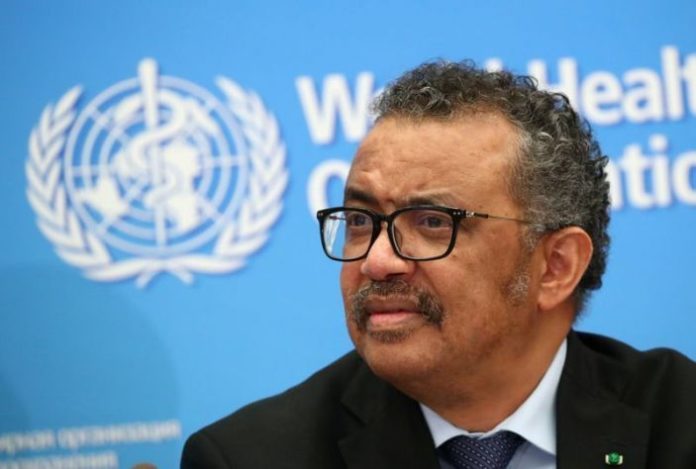By Jeph Ajobaju, Chief Copy Editor
“There will be no return to the old normal for the foreseeable future,” Tedros Ghebreyesus, warned on Monday, coinciding with research findings that immunity in recovered patients may be temporary and the disease may recur.
The World Health Organisation (WHO) director general told a media briefing in Geneva that “there is a roadmap to a situation where we can control the disease and get on with our lives.
“[But] we need to reach a sustainable situation where we do have adequate control of this virus without shutting down our lives entirely or lurching from lockdown to lockdown.”
To achieve this, he said three things would be required: a focus on reducing mortality and suppressing transmission; an “empowered, engaged community” that takes individual measures to protect the whole community; and strong government leadership and communication, CNN reports.
“It can be done. It must be done,” Tedros said.
He added that there are no shortcuts out of this pandemic, and that while the world hopes for an effective vaccine, there must be a focus on using the tools that are available now to suppress transmission and save lives.
Pandemic may get ‘worse and worse’
The BBC also quoted Tedros as warning that the pandemic is going to get “worse and worse” if certain governments do not take decisive action to curb the spread of the disease.
He said we are seeing “dangerous increases in cases” in countries where “proven measures to reduce risk are not implemented or followed.
“Let me blunt, too many countries are headed in the wrong direction. The virus remains public enemy number one, but the actions of many governments and people do not reflect this.”
In his view, “mixed messages from leaders” were undermining public trust in attempts to bring the pandemic under control.
While Tedors did not mention those leaders by name, some may interpret his pointed remarks as a warning to United States President Donald Trump and others who have been widely criticised for their handling of the pandemic.
“If the basics aren’t followed, there is only one way this pandemic is going to go,” Tedros added.
“It’s going to get worse and worse and worse.”
Trump’s rift with health officials deepens as cases surge
CNN adds that as the White House clashes with top health officials, infections have been climbing nationwide in the U.S., hitting 3.3 million, according to Johns Hopkins University’s tracker.
Below is a summary of what has been happening:
Trump has retweeted a social media post that accused the U.S. Centers for Disease Control and Prevention of “lying” about Covid-19. The original tweet was shared by conservative game-show host Chuck Woolery
The White House has also been briefing against the nation’s top infectious disease expert, Dr Anthony Fauci. In comments to U.S. media, a White House official said Fauci had “been wrong on things.”
Meanwhile, coronavirus infections continue to surge nationwide, especially in western and southern states, where lockdown restrictions were lifted earliest in some cases, according CNN.
On Sunday, Florida’s infections rose by more than 15,000 – the largest single-day increase since the pandemic began. A day earlier, parts of Walt Disney World had been reopened to much fanfare.
In contrast, New York City – previously the epicentre of the country’s epidemic – reported no new Covid-19 deaths over 24 hours for the first time since March
Immunity to coronavirus
Immunity to COVID-19 in recovered patients may only last a few months, and it could be caught again like a common cold, according to a new study.
Researchers at King’s College London looked into the immune response of 90 patients and healthcare workers at Guy’s and St Thomas’ NHS Trust and found antibodies peaked three weeks after the onset of coronavirus symptoms and then declined, Sky News reports.
Blood tests showed “potent” level of antibodies could be found in 60 per cent of participants during the peak of their battle with COVID-19; however, only 17 per cent sustained that same level three months later.
Infection rates have lessened but Italy is seeing the long-term effects COVID-19 has on survivors
Antibodies decreased 23-fold in some cases, and were depleted entirely in others.
“People are producing a reasonable antibody response to the virus, but it’s waning over a short period of time and depending on how high your peak is, that determines how long the antibodies are staying,” lead author Dr Katie Doores told The Guardian.
“Infection tends to give you the best-case scenario for an antibody response, so if your infection is giving you antibody levels that wane in two to three months, the vaccine will potentially do the same thing.
“People may need boosting and one shot might not be sufficient.”
Her comments suggest patients who had the most severe cases of COVID-19 had the highest antibody levels, and in turn those antibodies lasted the longest.











